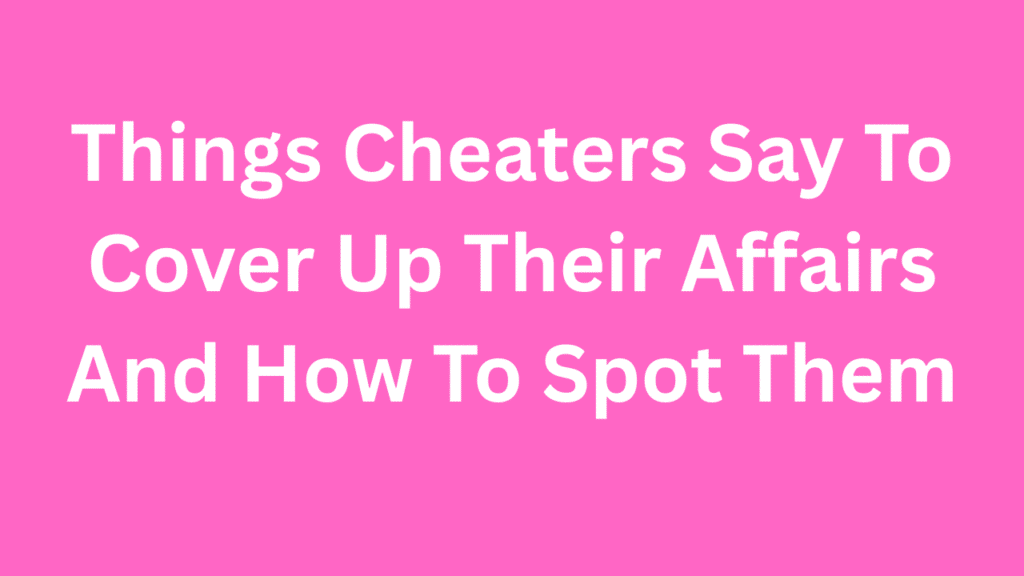Infidelity is painful, and unfortunately, it’s more common than most of us would like to admit. Cheaters often rely on carefully crafted excuses, gaslighting tactics, and emotional manipulation to cover up their affairs. Whether you’re just starting to suspect something or are deep in the thick of it, understanding the common phrases cheaters use—and the behaviors behind them—can help you spot the truth.
Here’s a breakdown of things cheaters say, why they say them, and how you can recognize the signs.
1. “You’re just being paranoid.”
This phrase is a classic gaslighting tactic. When a cheater senses you’re catching on, they often flip the script and try to make you doubt your instincts.
👉 Red Flag: If you bring up a genuine concern and they immediately dismiss it as “paranoia” instead of calmly discussing it with you.
💡 Spot It: You consistently feel confused, anxious, or like you’re overreacting. A trustworthy partner addresses your concerns, not mocks them.
2. “I’m just friends with them.”
This can be true—or it can be a smokescreen. Cheaters will often downplay their relationship with someone you’re suspicious of to avoid confrontation.
👉 Red Flag: If their “friendship” involves secret texting, emotional intimacy, or hiding interactions from you.
💡 Spot It: They become defensive or annoyed when you ask about this person. Their social media messages or DMs are locked down tight.
3. “You’re too controlling.”
Another deflection. When you start asking questions or setting boundaries, a cheater may accuse you of being possessive or overly controlling to avoid accountability.
👉 Red Flag: You’re being called “controlling” simply for wanting basic transparency in the relationship.
💡 Spot It: You’re walking on eggshells just for asking normal questions like where they’ve been or who they’re texting.
4. “I was working late.”
Sometimes it’s true—but when it becomes a pattern, it can signal something deeper. This is one of the most overused excuses in the cheating playbook.
👉 Red Flag: They’re suddenly “working late” way more often, especially with vague details or no explanation.
💡 Spot It: Try checking for inconsistencies. For example, you text them during their supposed “work hours” and get delayed responses or silence.
5. “Why don’t you trust me?”
This phrase can be manipulative when used to guilt you into silence. It turns the focus on your flaws rather than their behavior.
👉 Red Flag: Trust is earned. If their actions are triggering suspicion, this question becomes a smokescreen, not an answer.
💡 Spot It: Ask yourself, “Do I not trust them because of what they’ve done—or because they keep saying I shouldn’t doubt them?”
6. “You’re just insecure.”
Cheaters will often use this line to invalidate your feelings. It’s an attempt to shift the blame onto you and make you question your emotional stability.
👉 Red Flag: You feel worse about yourself every time you bring up a concern.
💡 Spot It: Instead of offering reassurance, they make you feel guilty for needing it.
7. “I didn’t want to hurt you.”
While this may sound caring, it’s often used after a lie is exposed—just to soften the blow. In reality, it’s a way of justifying deception.
👉 Red Flag: They made the choice to hide something for themselves, not for your benefit.
💡 Spot It: Watch how often this excuse pops up after a secret is uncovered. If it’s a pattern, it’s not about protection—it’s about getting away with it.
8. “You’re the only one I want.”
When you’re suspicious or upset, a cheater may make exaggerated emotional declarations to calm you down.
👉 Red Flag: Their actions don’t match their words. They say you’re “the only one,” but they act distant, distracted, or secretive.
💡 Spot It: Pay attention to patterns. Do they say this only when they feel caught or when you’re pulling away?
9. “Stop acting crazy.”
Labeling you as “crazy” is a way to invalidate your intuition. Cheaters often use this line to avoid uncomfortable conversations or accountability.
👉 Red Flag: You’re made to feel irrational or “crazy” for noticing inconsistencies or setting boundaries.
💡 Spot It: Trust how you feel. People who genuinely care don’t insult or demean you when you raise concerns.
10. “That never happened.”
This is straight-up gaslighting. If you clearly remember an incident or something suspicious and they deny it completely, they’re trying to rewrite reality.
👉 Red Flag: They deny obvious facts or twist events to make you doubt your memory.
💡 Spot It: Keep mental (or actual) notes. If you consistently find yourself confused or second-guessing your recollection, something’s off.
Additional Warning Signs (Even When They’re Not Saying Anything)
Sometimes it’s not just what cheaters say—it’s also what they don’t say or do. Here are subtle signs to look for:
- They suddenly become overly protective of their phone.
- They change passwords or hide screens when you’re near.
- They stop being emotionally available.
- They avoid eye contact or become unusually defensive.
- They make more effort with appearance but less effort with you.
What To Do If You Suspect Cheating
Feeling suspicious doesn’t automatically mean your partner is cheating—but your instincts are worth paying attention to.
✅ Communicate openly. Try having a calm conversation about your feelings without accusations.
✅ Observe patterns. One-off behaviors may mean nothing, but repeated lies and inconsistencies? Pay attention.
✅ Trust your gut. You don’t need proof to set boundaries. If something feels wrong, you’re allowed to step back and evaluate the relationship.
Final Thoughts
Cheaters often rely on emotional manipulation and polished excuses to hide their betrayal. The key to spotting lies is watching for patterns, not just words. It’s painful to question someone you care about, but protecting your peace matters more than holding onto someone who won’t respect it.
Remember: Real love doesn’t make you doubt your worth or your sanity.



